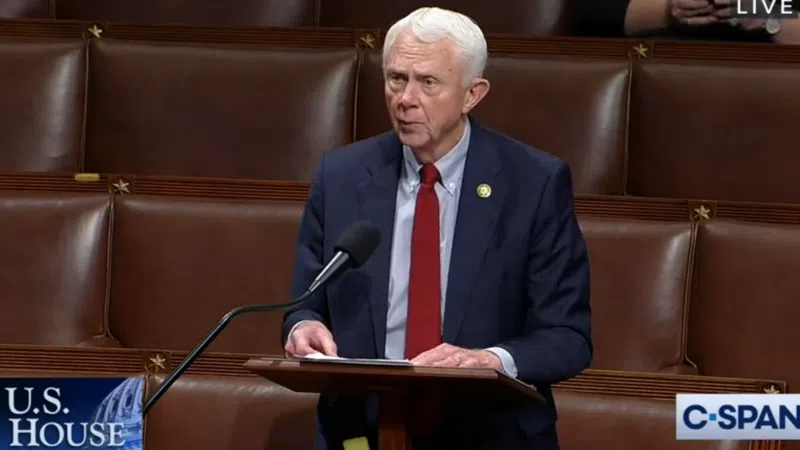The U.S. Army Corps of Engineers, Detroit District, announces that the New Soo Lock project in Sault Ste. Marie, Michigan reached a new milestone, Tuesday, when President Donald J. Trump signed America’s Water Infrastructure Act into law.
Since this act includes authorization for the construction of the new lock, the project can now compete with other construction projects throughout the country for appropriations, or funding. The project is authorized to be 100 percent federally funded and will be considered for appropriations in the next funding cycle.
“The U.S. Army Corps of Engineers, Detroit District, understands the significance of this critical project,” said Lt. Col. Greg Turner, district engineer. “We stand ready to execute the New Soo Lock construction and have already begun taking steps to minimize the time from receipt of funding to project completion.”
This authorization is for construction at the current cost estimate of $922.4 million, which was updated as part of the New Soo Lock Economic Validation Study that was completed in June by the U.S. Army Corps of Engineers, Detroit District.
The Soo Locks are situated on the St. Marys River at Sault Ste. Marie, Michigan and allow vessels to transit the 21 foot elevation change at the St. Marys Falls. This New Soo Lock project would construct a second Poe-sized lock (110′ by 1,200′) on the site of the existing Davis and Sabin Locks. The Soo Locks are nationally critical infrastructure and the reliability of this critical node in the Great Lakes Navigation System is essential to U.S. manufacturing and National Security.
For more information about the New Soo Lock project, visit our website: https://www.lre.usace.army.mil/About/Highlighted-Projects/New_Soo_Lock/
To read the America’s Water Infrastructure Act of 2018 in full: https://www.congress.gov/bill/115th-congress/senate-bill/2800/text
The following is a press release from the Michigan Farm Bureau:
According to MFB National Legislative Counsel John Kran, the Senate approved S. 3021, America’s Water Infrastructure Act of 2018 (WRDA 2018) by a 99-1 vote on Oct. 10, 2018. The U.S. House overwhelmingly approved the measure by a 408 to 2 vote in June.
The bipartisan, bicameral agreement provides improvements to the nation’s ports, inland waterways, locks, dams, flood protection, ecosystem restoration, and other water resources infrastructure. Given agriculture’s dependence on efficient ports and inland waterway infrastructure Kran said Farm Bureau policy supported the legislation.
“That is very significant,” Kran said, explaining that currently only the Poe Lock, out of the four existing locks, is capable of accommodating ships larger than 730 feet. “Many of today’s cargo ships needing to make the 21-foot transition from Lake Superior to Lake Huron are in excess of a 1,000 feet. So if something were to go wrong with that one lock, the economic impact would be significant and immediate.”
According to Kran, the Soo Locks are a critical waterway, not only for agriculture, but for a majority of iron ore for the U.S. The Poe lock, the only lock capable of handling 1000-foot vessels, accounts for about 70 percent of shipments.
A Department of Homeland Security’s Office of Cyber and Infrastructure analysis concluded it was “hard to conceive” of a single piece of infrastructure more consequential than the Poe lock in terms of impact to the economy from an unexpected and sustained breakdown.
According to Kran, that report projected that a six-month closure of the Poe lock would bring steel production and manufacturing industries to an effective halt, with the ripple effects down the iron ore supply chain crippling the United States economy and costing 11 million jobs. The report concludes that the national unemployment rate would hit 11.3 percent, exceeding the 10 percent rate in October 2009 during the recession.
In a press release following Senate approval, Sen. Debbie Stabenow (D-MI) praised passage of the legislation which included her Soo Locks Modernization Act to authorize full funding for the modernization of the Soo Locks, including authorizing Congress to provide the necessary funding to construct another Poe-size lock.
Earlier this year, Senator Stabenow successfully called on the U.S. Army Corps of Engineers and the Administration to complete a critical economic analysis that accurately reflects the importance of this project to our economy and national security.
That Army Corps of Engineers Economic Reevaluation Report released earlier this year pegs the estimated cost of a replacement lock to be $922.4 million.
“After a hard-fought effort, the Senate passed my bipartisan bill greenlighting the nearly $1 billion needed to modernize the Soo Locks, Stabenow said. “In Michigan, we know how vital the Locks are to our economy and our national defense. We also know that we are on borrowed time until something happens that shuts them down.”





















